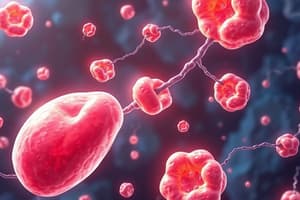Podcast
Questions and Answers
What percentage of cholesterol in egg yolks is esterified?
What percentage of cholesterol in egg yolks is esterified?
- 70%
- 20%
- 50%
- 10% (correct)
What is the primary enzyme responsible for hydrolyzing cholesterol esters in the diet?
What is the primary enzyme responsible for hydrolyzing cholesterol esters in the diet?
- Acyl-CoA:cholesterol acyltransferase 2
- Pancreatic lipase
- Niemann-Pick C1 like 1
- Cholesterol esterase (correct)
Which protein mediates the uptake of cholesterol into enterocytes?
Which protein mediates the uptake of cholesterol into enterocytes?
- ACAT2
- Cholesterol esterase
- NPC1L1 (correct)
- Phytosterol transporter
What effect do phytosterols have on cholesterol absorption?
What effect do phytosterols have on cholesterol absorption?
Which condition must be met for cholesterol to be incorporated into micelles?
Which condition must be met for cholesterol to be incorporated into micelles?
What is the daily dietary intake of cholesterol typically seen?
What is the daily dietary intake of cholesterol typically seen?
What is the fate of cholesterol that is not absorbed in the intestine?
What is the fate of cholesterol that is not absorbed in the intestine?
How does efficient cholesterol absorption affect cholesterol homeostasis in the body?
How does efficient cholesterol absorption affect cholesterol homeostasis in the body?
What is the primary function of low-density lipoprotein (LDL) concerning cholesterol?
What is the primary function of low-density lipoprotein (LDL) concerning cholesterol?
How does high-density lipoprotein (HDL) contribute to cholesterol homeostasis?
How does high-density lipoprotein (HDL) contribute to cholesterol homeostasis?
What is the primary component of cell membranes that interacts with cholesterol?
What is the primary component of cell membranes that interacts with cholesterol?
Which mechanism is utilized by cells to regulate excess cholesterol levels in membranes?
Which mechanism is utilized by cells to regulate excess cholesterol levels in membranes?
Which factor influences the fluidity and integrity of animal cell membranes?
Which factor influences the fluidity and integrity of animal cell membranes?
What is the role of SREBPs in cholesterol metabolism?
What is the role of SREBPs in cholesterol metabolism?
How does phytosterol intake affect cholesterol levels in the body?
How does phytosterol intake affect cholesterol levels in the body?
Which strategy can be employed to manage hypercholesterolemia?
Which strategy can be employed to manage hypercholesterolemia?
What is the primary role of the proteins ABCG5 and ABCG8 in cholesterol metabolism?
What is the primary role of the proteins ABCG5 and ABCG8 in cholesterol metabolism?
How does ezetimibe affect cholesterol absorption?
How does ezetimibe affect cholesterol absorption?
Which statement accurately describes the condition known as sitosterolemia?
Which statement accurately describes the condition known as sitosterolemia?
What was the main active ingredient in the historical treatment for elevated blood cholesterol marketed as Cytellin?
What was the main active ingredient in the historical treatment for elevated blood cholesterol marketed as Cytellin?
In patients with familial hypercholesterolemia, what is the effect of adding ezetimibe to ongoing statin treatment?
In patients with familial hypercholesterolemia, what is the effect of adding ezetimibe to ongoing statin treatment?
What is the typical overall efficiency of cholesterol absorption in the human body?
What is the typical overall efficiency of cholesterol absorption in the human body?
What type of fatty deposits are indicative of high LDL cholesterol levels in patients with familial hypercholesterolemia?
What type of fatty deposits are indicative of high LDL cholesterol levels in patients with familial hypercholesterolemia?
Flashcards
Esterified cholesterol absorption
Esterified cholesterol absorption
Esterified cholesterol needs hydrolysis to free cholesterol and fatty acids to be absorbed by micelles.
Cholesterol esterase
Cholesterol esterase
An enzyme that hydrolyses cholesterol esters into free cholesterol and free fatty acids.
Cholesterol absorption sources
Cholesterol absorption sources
Cholesterol for absorption comes from diet and bile.
Cholesterol absorption efficiency
Cholesterol absorption efficiency
Signup and view all the flashcards
Cholesterol excretion
Cholesterol excretion
Signup and view all the flashcards
NPC1L1 protein
NPC1L1 protein
Signup and view all the flashcards
Cholesterol esterification
Cholesterol esterification
Signup and view all the flashcards
Phytosterol displacement
Phytosterol displacement
Signup and view all the flashcards
What happens to phytosterols after absorption?
What happens to phytosterols after absorption?
Signup and view all the flashcards
How do ABCG5 and ABCG8 affect cholesterol absorption?
How do ABCG5 and ABCG8 affect cholesterol absorption?
Signup and view all the flashcards
What are the benefits of phytosterols in lowering cholesterol?
What are the benefits of phytosterols in lowering cholesterol?
Signup and view all the flashcards
What is sitosterolemia?
What is sitosterolemia?
Signup and view all the flashcards
How does ezetimibe work?
How does ezetimibe work?
Signup and view all the flashcards
What are the effects of ezetimibe on cholesterol levels?
What are the effects of ezetimibe on cholesterol levels?
Signup and view all the flashcards
What are xanthomas?
What are xanthomas?
Signup and view all the flashcards
How do xanthomas develop?
How do xanthomas develop?
Signup and view all the flashcards
Cholesterol: Friend or Foe?
Cholesterol: Friend or Foe?
Signup and view all the flashcards
Cholesterol Transport: The LDL & HDL Duo
Cholesterol Transport: The LDL & HDL Duo
Signup and view all the flashcards
What's the Deal with Cholesterol Esters?
What's the Deal with Cholesterol Esters?
Signup and view all the flashcards
Cholesterol's Role in Membrane Fluidity
Cholesterol's Role in Membrane Fluidity
Signup and view all the flashcards
SREBPs: The Cholesterol and Fatty Acid Controllers
SREBPs: The Cholesterol and Fatty Acid Controllers
Signup and view all the flashcards
Where's Cholesterol Found?
Where's Cholesterol Found?
Signup and view all the flashcards
Reverse Cholesterol Transport: The Cleanup Crew
Reverse Cholesterol Transport: The Cleanup Crew
Signup and view all the flashcards
Cholesterol: A Balancing Act
Cholesterol: A Balancing Act
Signup and view all the flashcards
Study Notes
Cholesterol
- Cholesterol is a major sterol in animal tissues, found in tissues and plasma as free cholesterol or as a storage form, combined with a long-chain fatty acid as cholesteryl ester.
- Cholesterol is transported in lipoproteins.
- Plasma LDL carries cholesterol into tissues.
- Free cholesterol is removed from tissues by plasma high-density lipoprotein and transported to the liver for excretion as bile acids (reverse cholesterol transport).
- Cholesterol is nearly 25% of lipids in plasma membranes of some nerve cells, but may be absent in other intracellular membranes.
- Cells can regulate cholesterol levels by esterifying excess cholesterol with a fatty acid and storing cholesterol esters in vesicles.
- Unesterified cholesterol is transported back to the membrane when needed.
- Cholesterol increases membrane packing, which both alters membrane fluidity and maintains membrane integrity.
- Cholesterol allows animal cells to change shape and for animals to move.
- Cholesterol biosynthesis in hepatocytes is negatively regulated by cholesterol itself, primarily influencing the HMG-CoA reductase reaction.
SREBPs
- SREBPs (Sterol Regulatory Element Binding Proteins) activate the cholesterol and fatty acid synthesis program in the liver.
- Different SREBPs (SREBP-1c and SREBP-2) preferentially activate genes related to cholesterol and/or fatty acid and triglyceride metabolism.
- In the presence of cholesterol or oxysterols, SREBP-Scap is retained in the ER.
- In the absence of sterols, SREBP-Scap is loaded into COPII vesicles through interactions with Sec23/24
- After transport to the Golgi, SREBP's transcription factor domain is released from the membrane by proteolytic cleavage events (S1P and S2P proteases).
HMG-CoA Reductase (HMGCR)
- HMG-CoA reductase is the rate-limiting step in cholesterol synthesis in hepatocytes.
- The enzyme is competitively suppressed under normal conditions due to negative feedback regulation by end products like cholesterol and oxysterols.
- It plays a crucial role in regulating cholesterol biosynthesis from acetyl-CoA to mevalonate.
- HMG-CoA reductase is a target of statins, a class of pharmaceuticals used to reduce cholesterol levels.
Mevalonate Pathway
- The mevalonate pathway is also known as the isoprenoid pathway or HMG-CoA reductase pathway and is present in eukaryotes, archaea, and some bacteria.
- The pathway produces isopentenyl pyrophosphate (IPP) and dimethylallyl pyrophosphate (DMAPP).
- These building blocks are used to produce isoprenoids, a diverse class of biomolecules, such as cholesterol, vitamin K, coenzyme Q10, and steroid hormones.
Cholesterol Absorption and Excretion
- Cholesterol in the intestine must be incorporated into micelles for absorption in the enterocyte.
- Cholesterol is absorbed through NPC1L1 (Niemann-Pick C1-like 1)
- Cholesterol esters are hydrolyzed and become free cholesterol to be incorporate into the micelles.
- Phytosterols, transported via ABCG5/ABCG8, are also absorbed but can displace cholesterol.
- Cholesterol not absorbed is excreted in feces.
- Fecal excretion, with no cholesterol oxidative pathways in humans, is the primary route for cholesterol catabolism.
- Ezetimibe blocks cholesterol absorption by inhibiting NPC1L1.
Familial Hypercholesterolemia (FH)
- FH is a genetic disorder characterized by elevated LDL-C levels.
- In most cases (75%), it is due to mutations in the LDLR gene, leading to defective LDL receptor function.
- Elevated LDL levels can cause early atherosclerosis.
- Homozygous FH (two mutated alleles) is a serious form with very high LDL that presents with severe clinical manifestations and generally requires aggressive management.
- Heterozygous FH(one mutated allele) is less severe.
Studying That Suits You
Use AI to generate personalized quizzes and flashcards to suit your learning preferences.




